 Q: I want to add my child’s name to the title of my home, so they can keep the house out of probate and receive my home quickly after my death. Do you see any concerns with my plan? A: The answer to your question is a solid “maybe”. Your personal circumstances will dictate whether this estate planning strategy is the best move for you. Adding your child’s name to your deed could speed the transfer of your home to your beneficiaries and keep it out of probate. But, before you run off and put your child’s name on the title of your house you should consider a few of these risks. Gift Taxes. By adding your child to the title of your home, you have made a gift that is subject to gift taxes. The gift is likely far below the current federal gift tax exclusion amount, so you shouldn’t have to pay gift taxes. However, you may need to file a gift tax return if the gift is over the annual exclusion amount. Medicaid benefits. If you need KanCare (Medicaid) assistance to pay for nursing home care within 5 years of adding your child’s name to the deed, you could be penalized when requesting benefits. Child’s Death. If your child dies before you, his/her interest in your home becomes part of his/her estate. This interest in your home will be subject to his/her liabilities and would pass to his/her beneficiaries as named in your child’s estate plan. Someone you don’t know or trust could become the new co-owner of your home. Disagreements. If you decide to sell the house and move, your child could legally refuse to transfer ownership back to you. Also, if your child wants to sell your home, that child could force a partition action, a sale of the real estate done through the court. Child’s creditors. If your child is involved in a serious accident, your house could have a lien placed on it to cover his/her debts not covered by insurance. Similarly, if your child is a joint owner, the value of the home could be subject to his/her creditors, should they face bankruptcy or credit issues. Child’s divorce. If your child gets a divorce after being added to your deed, his/her interest in your house may be part of the divorce settlement. Capital gains tax. If you sell the home after adding your child to the deed, your child may encounter unintended capital gains tax problems. No legal obligation. If you add one child’s name to the deed and instruct him/her to share the proceeds from the sale of the home with your other children after your death, they may not be legally obligated to do so. Your other children could be cut out of the inheritance that you intended for them to have. The type of ownership that you give to your child is a very important factor in your considerations. Should you establish a joint tenancy with rights of survivorship (JTWROS), a tenancy in common (TOC), or perhaps you should do a transfer on death deed? Consulting an experienced estate planning attorney prior to adding anyone to your deed will inform you of the pros and cons of each option, as it relates to your personal circumstance. Without adequate counsel, the complications that could arise from such a move may outweigh any possible benefits. For more information on estate planning, probate or real estate matters, contact Davis & McCann, P. A., Dodge City, KS. We are members of Wealth Counsel, a national consortium of Estate Planning Attorneys and Elder Law. We focus our practice on providing clients with the best legal advice on Estate Planning, Probate, Trust Administration, Medicaid and Long-term Care Planning, Family Business/Small Business Succession Planning, Real Estate Transactions, 1031 Exchanges, and related matters.  We all have reasons for procrastinating when it comes to estate planning. However, before you put this important life decision back on the shelf again, you might want to know a few of the things that can happen to your money and possessions upon your death if you haven’t planned. These Kansas probate rules may encourage you to move just a little quicker to finish or update your estate planning. Did you know?
These are just a few of the Kansas probate laws that control what happens to your money and property after your death. If you have questions about probate or estate planning matters, contact Davis & McCann, P.A., Dodge City, Kansas at 620-225-1674. We are members of Wealth Counsel, a national consortium of Estate Planning Attorneys and the National Academy of Elder Law Attorneys (NAELA). We focus our practice on providing clients with the best legal advice on Estate Planning, Medicaid and Long-term Care Planning, Special Needs Planning, Family Business/Small Business Succession Planning, Probate, Trust Administration, Real Estate, 1031 Exchanges, and related matters. 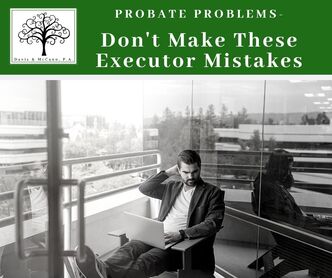 Are you unwittingly making mistakes as an Executor of an Estate? If so, you could be in for a legal battle of your own! To help protect you in your role as Executor, we’re sharing a few of the most common mistakes we’ve seen made by Executors, that you’ll want to avoid.
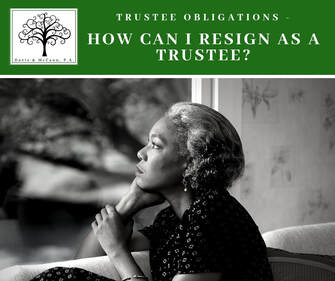 Acting as Trustee of a Trust can be challenging, and you should understand the responsibilities and duties involved if you are to serve in such a position. Although you may have initially been willing to assume this role, there may come a time when you know you want to resign as Trustee. Perhaps the administration of the Trust is taking more time and energy than you have available, or perhaps your health has deteriorated to the point where you no longer can properly carry out your duties; you don’t need to have a specific reason to resign. However, if you do need to resign as Trustee of a Trust there are a series of steps that should be followed to ensure that you are released, as much as possible, from any further liability. A Trustee resignation should occur pursuant to the terms of the Trust. As long as you are Trustee, you are a fiduciary of the Trust with a duty of loyalty and a duty of care to the Trust and to the beneficiaries. Therefore, you must resign properly in order to ensure that you are not held responsible for problems that may occur due to your resignation or after your resignation. Even if the terms of the Trust seem clear and easy, you should consult with an attorney to ensure you are in compliance with the Trust and the law. To resign as Trustee, the following steps generally must occur: 1. Check the original Trust document to see if there is a successor Trustee named. If there is no successor Trustee listed, a new Trustee will have to be appointed. The Trust may allow you to appoint a successor Trustee, but a thorough examination of the Trust will be required to determine this. If one or more of the original Grantors are still living and capable, they can name a successor trustee, if the Trust is a Revocable Trust. If the Grantor is unable to appoint a new Trustee, the current beneficiaries may be able to appoint a new Trustee. As a last resort, the Court always has the ability to appoint a successor Trustee. Whether these options are available to you depends largely on the terms of the Trust and the type of Trust. 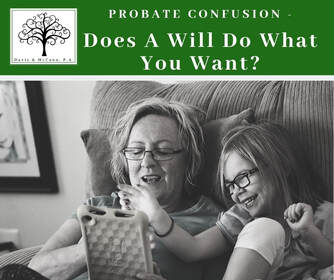 If you or a family member have faced a recent health scare, such as the kind presented by the Coronavirus, it’s likely that you’ve been told to update your Last Will and Testament. You may have had a new Will prepared or had your previous Will updated with a Codicil. While preparing a Will generally is a move in the right direction when it comes to estate planning, it may not be the “best” option for you individually. A Will is one of the most basic levels of estate planning that you can do in order to direct how and to whom your assets will be distributed upon your death. People often misunderstand the estate process and assume that their assets will automatically pass to the beneficiaries found in their Will after their death. What they don’t realize, is that assets that pass by way of a Last Will and Testament must first go through the probate process before any distributions can legally take place. To clear up some of that confusion, here are some answers to common misconceptions surrounding the probate process: 1. If you have a Will, your family will not have to go through a probate. Not true! In fact, if you do Will-based planning, you are planning for a probate. This means your estate will go through a court process and be open to public examination before your beneficiaries will receive their inheritance. Your named Executor under the Will cannot even act on behalf of your estate until the court has granted them approval to do so. 2. Probate is a simple and speedy process. This is rarely true. On average, it takes up to 16 months to settle an estate. That’s a significant wait time for beneficiaries to receive the assets you intended them to have. Additionally, you will need legal assistance if you are required to open a probate in an estate due to the complexity of the process. Professional help from a good probate attorney will be your best insurance for preventing unnecessary expenses and delays during the probate process. 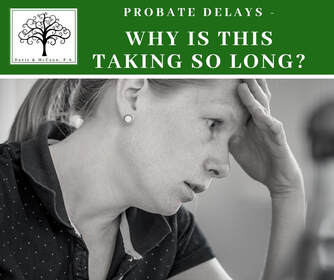 Q: “My mother, who resided in Kansas, died in June. She had a Last Will and Testament and owned several pieces of real estate. She told us children that we would receive an equal share of her estate. How long will I have to wait to receive my share and what situations might delay the distribution?” A: Because your mother chose to use a Will as her estate planning strategy, her estate will require a probate action initiated by the filing of a Petition for Probate of Will with the District Court in the county of her permanent residence. Filing must happen within six months after the date of her death. Failure to file her Will within this six month period will result in her estate being handled as if no Will existed. Anyone having knowledge and access to her Will may offer it for probate at any time within the six months following her death. Usually, the Executor or Administrator named in her Will is responsible for filing the Petition with the assistance of a probate attorney. Your Mother’s estate may need to file a federal estate tax return. Kansas currently doesn’t have an estate tax, so no state estate tax return should be necessary, unless your Mother owned property in another state. Tax payments are due no later than nine months after the date of death. For your mother’s estate, these tax returns must be filed and paid (if applicable) no later than next March, unless an extension has been properly requested. Additionally, if your mother owned property in a state other than Kansas, a separate probate action in that state may be required. After the Petition for Probate of Will has been filed, you generally can expect the Executor or Administrator to be appointed by the Court within 4 to 5 weeks from the date the petition is filed. If your mother had outstanding debts due to creditors, they have 4 months after they have been notified to file their claims against the estate. Any distributions of an estate will typically not occur until after this time period has run. Since each estate is unique, no exact time schedule can be given for the length necessary to probate an estate. Distributions to beneficiaries generally don’t happen until the estate is ready to close, but if circumstances warrant it, the Executor or Administrator may do a partial distribution prior to that time. Some factors that may delay an estate closure and distribution can include: 1. Appraisal of real property, equipment and household items. A certified appraiser is not always available in a timely fashion, especially for rural residents. Certified appraisers are often booked out months in advance, or must travel long distances, so obtaining a quick appraisal for the real estate isn’t always feasible. If family members are contentious, multiple appraisals may be required to satisfy the parties involved, which can add to the delay. 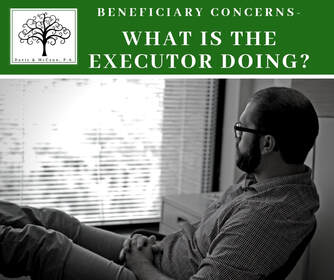 You’ve been named as a beneficiary of someone’s Last Will and Testament! What does that mean and what can you expect? As a beneficiary, the Grantor of the will named you to receive something from their estate. It could be anything from cash, stock, investments, real estate, minerals, or a personal possession. An Executor is the person the Grantor named to be in charge of managing estate assets, paying estate bills, working with the estate accountant and attorney, distributing the estate assets, etc. This is the first person to whom you should address your questions about the estate. As a beneficiary, you have certain rights in the probate case. Here’s a few pointers on what you can expect from the Executor and the probate process: Executors have fiduciary duties and must put the interest of the estate before their own personal desires, even if they also are a beneficiary of the will. Although Executors are required to act prudently, many Executors lack the skills or knowledge they need to handle an estate administration. Without professional guidance from an experienced attorney, Executors can easily mishandle an Estate and be subject to monetary and legal ramifications. Executors must: 1. Put estate beneficiaries’ financial interests above their own; 2. Protect estate assets by preserving their value until final distribution; 4. Be impartial toward all beneficiaries regarding distributions; 5. Follow the instructions given in the will; 6. Keep good financial records of all estate account activities and provide a copy of these records to beneficiaries upon request; 7. Pay estate bills and beneficiaries when deemed appropriate by the Court or according to state law (creditors are paid before beneficiaries, so final distribution amounts may be lower than what is stated in the will); and 8. Communicate with creditors and beneficiaries pursuant to state law. Executors cannot: 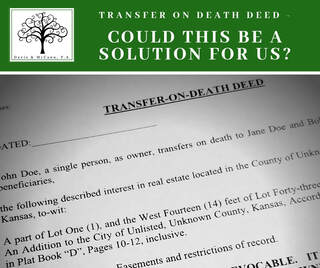 Q: My grandfather has very few assets except his residence in Kansas. He would like his house to go to my mother upon his death. Is there any way the property can transfer to my mother without a probate? A: One of the easiest ways to accomplish this would be for your grandfather to execute a transfer on death deed to your mother. The transfer on death deed will transfer ownership of the property at your grandfather’s death, without probate, to your mother or any other person he names on the deed. How does the transfer on death deed work in Kansas? The property owner (the “Grantor”) executes a specific deed that names a successor beneficiary as the recipient of the property at the Grantor’s death. The deed is then signed before a notary and recorded with the Register of Deeds in the county where the property is located. The Grantor remains the legal owner while living. In addition, he may revoke the deed at any time prior to death by executing and recording a formal revocation or new deed with the county Register of Deeds. At the Grantor’s death, the person named as the beneficiary on the deed becomes the new property owner as soon as the Grantor’s death certificate is filed against the property. Advantages/Disadvantages of transfer on death deed: 1. The property will pass to the named person after Grantor’s death without an expensive and lengthy probate. 2. The Grantor retains ownership and control of the property so long as he/she is living. 3. The property passes to the new owner immediately after the Grantor’s death. No delay occurs in the transfer of ownership; only the recording of the Grantor’s certified death certificate with the county Register of Deeds is required. 4. A transfer on death deed also can be used to transfer mineral interests. 5. A transfer on death deed provides future flexibility and the ability to revoke or change beneficiaries. 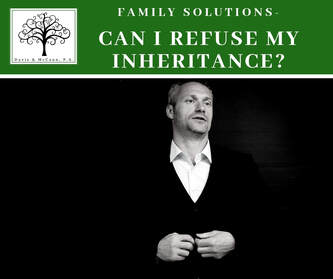 Q: Dad died without a Will or Trust. From what I understand of Kansas law, my sibling and I will share equally in one-half (1/2) of his estate and Mom will inherit the other one-half (1/2). My parents were not economically stable at the time of my father’s death. My sibling and I both are financially comfortable, are not married and have no children. Is there any way we can reject our inheritance, and have it go to our mother so she could live more comfortably? A: Under Kansas probate law, you and your sibling can disclaim your inheritance, which would allow your mother to receive 100% of your father’s estate. If you had children, your share would pass to them, instead of your mother, pursuant to Kansas intestate law. However, in this situation, the disclaimers from you and your sibling would provide for your shares to be redirected to your mother. Disclaimers are used in post-mortem (after death) planning for different reasons. One major reason is to avoid unnecessary tax issues. If a parent leaves his well-off children property this bequest may create future estate tax problems for his grandchildren. If the children disclaim the property now, it can often pass directly to the grandchildren who may not have an estate tax problem. There are a few rules you must also follow if you intend to disclaim inherited property. 1. Written Document. Your disclaimer must (1) be a written instrument describing the property, interest or power you are disclaiming; (2) contain a declaration of disclaimer; and (3) be signed and acknowledged by the disclaimant. 2. Time Limit. States have different laws concerning how long you have to disclaim property, but if you are disclaiming property due to federal estate tax issues, you usually have to file your disclaimer within 9 months of the decedent’s death. Beneficiaries under the age of 21 have additional time to disclaim their interest. 3. No Acceptance. You cannot receive any benefit from the property before disclaiming it. For example, if the property is an investment portfolio, you cannot cash a dividend check and then disclaim the portfolio. If your inheritance is real estate, you can't accept any rent if you intend to later disclaim the property. 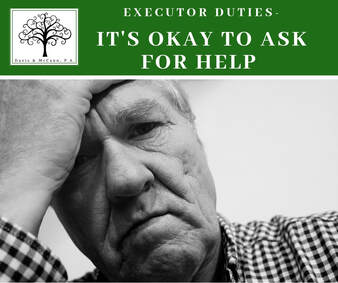 When your loved one dies, an experienced probate attorney can be a great asset. If your loved one had a will then there should be a person named to be in charge of wrapping up the estate, called an Executor. The Executor is generally a surviving spouse, an adult child, a trusted friend or relative, or a trust company named in the will. If your loved one had no formal will appointing an Executor, a court appointed Administrator may be required to pass assets on to his/her heirs at law. The Executor or Administrator has a special responsibility to act in the best interest of the Estate beneficiaries and see that the Estate assets and money are not wasted. If you are an Executor or Administrator, one of the smartest ways to ensure you are acting in the best interests of the Estate beneficiaries is to hire an experienced probate attorney. Your attorney should be willing to provide you with a basic education of the probate process so you can determine which tasks you can handle independently and which ones will require professional guidance. The Estate is responsible for paying the attorney fees, so there should be no personal cost to you. Hiring a probate attorney who has good communication skills and makes themselves available to you is the ticket to a successful estate administration. The following is a sample of services an experienced probate attorney should offer Executors or Administrators during the probate process: 1. Assist with obtaining copies of death certificates and a dated obituary notice and/or newspaper articles. 2. Coordinate meetings with the decedent’s family and/or beneficiaries, as necessary. 3. Advise on checking the contents of any safe deposit boxes and on obtaining copies of marriage and birth certificates. 4. Help with compiling a list of heirs, next of kin and beneficiaries. 5. Review the decedent’s will with the Executor/Administrator and decedent’s family to determine whether probate is needed and if so, what probate proceeding is most appropriate. 6. Proceed with probate filing, if no trust was created. 7. If necessary, obtain letters testamentary or letters of administration for the executor/administrator from the court. 8. Assist with inventory of tangible real estate property and obtaining real estate deeds, mortgages, leases, and tax information, as well as provide guidance with inventorying and securing personal items such as cars, trucks, boats, recreational vehicles, mobile homes, motorcycles, furniture, fine jewelry, art and personal contents of the home(s). |
NEWS YOU CAN USEDavis & McCann, P. A., Archives
April 2021
Categories
All
|

 RSS Feed
RSS Feed